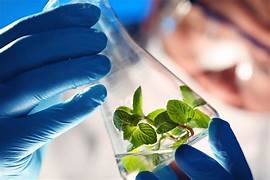Biotechnology is a rapidly growing field that uses living organisms or their components to create products or processes that benefit society. It has the potential to revolutionize many industries, including agriculture, medicine, and energy.
Agriculture
Biotechnology is already being used in agriculture to improve crop yields, increase resistance to pests and diseases, and improve the nutritional value of food. For example, genetically modified crops are now widely used in the United States and other countries. These crops have been engineered to resist herbicides, which allows farmers to use less weed killer and save money. They have also been engineered to produce higher yields, which helps to feed a growing population.
In addition to genetically modified crops, biotechnology is also being used to develop new ways to produce food. For example, scientists are working on ways to grow meat in labs without the need for animals. This could help to reduce the environmental impact of meat production and make it more affordable.
Medicine
Biotechnology is also having a major impact on the field of medicine. It is being used to develop new drugs, vaccines, and diagnostic tests. For example, biotechnology has led to the development of drugs for HIV/AIDS, cancer, and other diseases. It has also led to the development of vaccines for diseases such as hepatitis B and human papillomavirus (HPV).
In addition to developing new drugs and vaccines, biotechnology is also being used to develop new ways to deliver drugs to the body. For example, scientists are working on ways to use nanoparticles to deliver drugs directly to cancer cells. This could improve the effectiveness of cancer treatments and reduce the side effects.
Energy
Biotechnology is also being used to develop new sources of energy. For example, scientists are working on ways to produce biofuels from crops such as corn and soybeans. Biofuels can be used to power vehicles and generate electricity.
In addition to biofuels, biotechnology is also being used to develop new ways to produce hydrogen fuel. Hydrogen is a clean and renewable source of energy that could be used to power vehicles and generate electricity.
The Future of Biotechnology
The future of biotechnology is very promising. It has the potential to revolutionize many industries and improve the quality of life for people around the world. As biotechnology continues to develop, we can expect to see even more amazing breakthroughs in the years to come.
Here are some of the potential benefits of biotechnology:
- Improved food production: Biotechnology can help to increase crop yields, improve the nutritional value of food, and make food production more sustainable.
- New drugs and vaccines: Biotechnology can be used to develop new drugs and vaccines for a variety of diseases.
- Improved diagnostics: Biotechnology can be used to develop new diagnostic tests for diseases, which can help to improve early detection and treatment.
- New sources of energy: Biotechnology can be used to develop new sources of energy, such as biofuels and hydrogen fuel.
- Environmental benefits: Biotechnology can be used to reduce pollution, improve water quality, and protect wildlife.
Of course, there are also some potential risks associated with biotechnology, such as the possibility of creating new diseases or organisms that are harmful to the environment. However, the potential benefits of biotechnology far outweigh the risks. With careful planning and regulation, biotechnology can be used to improve the lives of people around the world.





